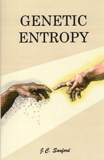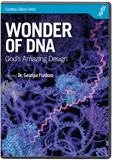Vestigial Genes?
News Source
- Science Daily: "Genetic Research Reinforces Theory of Evolution"
According to this article, geneticists have discovered a new category of pseudogenes—genes that seem to serve no purpose. The concept of pseudogenes isn’t new; evolutionists have alleged for years that some genes are simply useless legacies of evolution and, therefore, proof for common descent. The first major problem with this concept is that there is no scientific way to prove a negative—for all these scientists know, next month, a study may reveal the exact function of each of these genes. Functions for some pseudogenes have been discovered already (see Pseudogene Function: Regulation of Gene Expression, Pseudogene Function: More Evidence, and Potentially Decisive Evidence Against Pseudogene “Shared Mistakes”). This is virtually identical to the old argument that so-called vestigial organs prove evolution. As we’ve pointed out in articles in our ‘Vestigial’ Organs Q&A, in many circumstances, the particular function of a certain organ was simply unknown, so evolutionists theorized that the organ was a legacy of descent from a species that used the organ.
The same is true for so-called pseudogenes: it is likely we simply haven’t yet discovered the purpose of the genes. That should not come as a surprise; after all, scientists only recently discovered a second code in DNA. If scientists have been studying DNA for half a century and didn’t discover this second code in DNA until last month, how much confidence do you have that pseudogenes definitely have no function?
True pseudogenes could be explained equally well by either evolution or creation, and wouldn’t provide evidence for one view or the other.
But even if scientists could prove a negative and show that pseudogenes are truly functionless, this would only confirm in the biblical worldview. Detrimental mutations have accumulated since the Fall, and surely most of Adam and Eve’s original genetic material has mutated to be less functional than it was in Eden. True pseudogenes could be explained equally well by either evolution or creation, and wouldn’t provide evidence for one view or the other.
The senior author of this recent study, Dr. Robert D. Nicholls of Children’s Hospital of Pittsburgh, comments, “Discussion over evolution and Intelligent Design really has centered on whether pseudogenes … have a function or not. The suggestion is that an Intelligent Designer would not make junk DNA, so if a pseudogene does have a function, this is claimed to support the idea of an Intelligent Designer.” Dr. Nicholls is overstating the significance of pseudogenes, since they are understandable from either perspective. However, the lack of pseudogenes—that is, if a definite function were found for every gene—would only fit with a creation perspective.
For More Information: Get Answers
Remember, if you see a news story that might merit some attention, let us know about it! (Note: if the story originates from the Associated Press, FOX News, MSNBC, the New York Times, or another major national media outlet, we will most likely have already heard about it.) And thanks to all of our readers who have submitted great news tips to us. If you didn’t catch all the latest News to Know, why not take a look to see what you’ve missed?
(Please note that links will take you directly to the source. Answers in Genesis is not responsible for content on the websites to which we refer. For more information, please see our Privacy Policy.)
Recommended Resources

Answers in Genesis is an apologetics ministry, dedicated to helping Christians defend their faith and proclaim the good news of Jesus Christ.
- Customer Service 800.778.3390
- © 2024 Answers in Genesis






